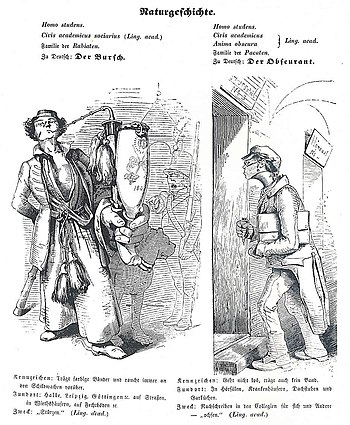Obscurity
Obscurity (from the Latin obscuritas "darkness, incomprehensibility") denotes a darkening in the figurative sense of a lack of clarity. The associated adjective obscure has been used in German since the 17th century to mean "dark, unknown, suspicious, [of] dubious origin".
In the area of information security , obscurity describes the attempt to achieve security through obscurity using the catchphrase " Security through obscurity ". The term “ obfuscation ” is often used from English when the aim is to make programming language unrecognizable for a user of the application.
obscurantism

In connection with the Enlightenment , the term obscurantism was coined, which goes back to the so-called dark man letters , Latin Epistolae obscurorum virorum , which appeared in the early 16th century (the title of a new edition of the work Der Teutsche Michel and Der Römische Pope. Old and new from the struggle of Teutschtum against Roman-Wälsche outwitting and patronizing in 666 Teses and quotations from Oskar Panizza reference). Obscurantism does not mean a fixed worldview. Obscurantism and the term for its followers, obscurant , were established as a critical term. Those who saw themselves as representatives of a mode of thinking committed to the Enlightenment used the word as a rhetorical device. The others, whose positions they considered “anti-Enlightenment”, “ metaphysical ” or “ religious ”, were assigned the attribution of being followers of obscurantism.
Heinrich Heine valued the word at the beginning of the 19th century and assigned numerous contemporaries, especially the supporters of a backward-looking romanticism , to obscurantism. He lets the protagonist in the mocking poem Der neue Alexander (III) say that he is "an enlightened obscurant and neither a stallion nor a mare!"
Friedrich Nietzsche writes in the text Die Obskuranten (1879) about obscurantism and Immanuel Kant :
“The essential thing about the black art of obscurantism is not that it wants to darken our heads, but that it wants to blacken the image of the world, to darken our idea of existence. [...] Subtle metaphysicians who prepare skepticism and, through their excessive acuteness, incite suspicion of acumen, are good tools for a finer obscurantism. - Is it possible that even Kant can be used for this purpose? yes, that, according to his own notorious explanation, he wanted something of this kind, at least temporarily: to make way for faith by showing the limits of knowledge? - What he did not succeed in doing, and his successors on the wolf and fox walks this highly refined and dangerous obscurantism, [...] "
Meyers Konversationslexikon in the edition of 1888 finally declares the obscurants to be "darklings":
“Obscurantism (lat.), In contrast to enlightenment (sd), both the tendency to spiritual twilight and the system to keep others from enlightening. The followers of O. are called obscurants (darklings). "
The term obscurantism can be found in particular as a term in texts that are directly related to the era of the Enlightenment or the ideas associated with it. In general German usage it was - unlike the adjective obscure - meanwhile already uncommon. In current dictionaries and encyclopedias, however, the term obscurantism is still present as an endeavor to deliberately "keep other people in ignorance, to prevent their independent thinking and to make them believe in the supernatural (see occultism ) ."
References and comments
- ↑ obscuritas . Pons publishing house . Retrieved November 5, 2012.
- ^ Oskar Panizza : German theses against the Pope and his dark men. [1894] With a preface by MG Conrad . New edition (selection from the “666 theses and quotations”). Nordland-Verlag, Berlin 1940.
- ^ Oskar Panizza: The German Michel and The Roman Pope. Old and new from the struggle of Teutschtum against Roman-Wälsche outwitting and paternalism in 666 teses and quotations. With an accompanying word by Michael Georg Conrad. Wilhelm Friedrich, Leipzig 1894.
- ^ Friedrich Nietzsche: Menschliches, Allzumenschliches. A Book for Free Spirits , Volume Two: Opinions and Proverbs 1–39, 27. The Obscurants, 1879
- ↑ Duden Foreign Dictionary 1960 on Obskurant : “outdated for dark man, Finsterling”, obscurantism : “out of date for the way of thinking of the dark men; Stupor "
- ↑ according to Meyers Lexikon online as of April 16, 2007
- ^ Obskurantismus, duden.de, accessed on September 6, 2011